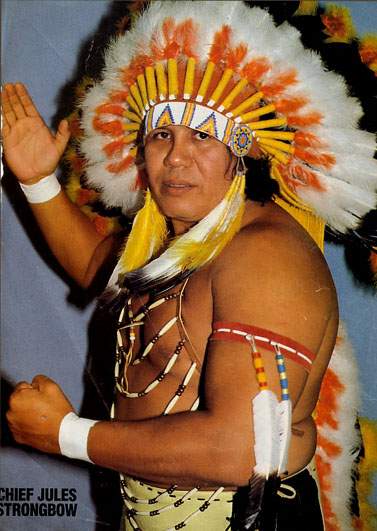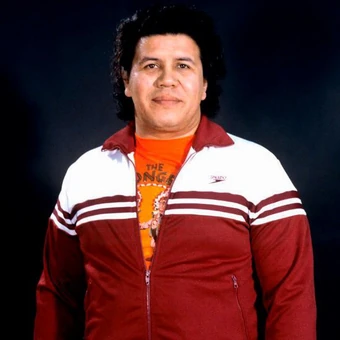At the age of 32, Jules Strongbow, né Francis Huntington, was sitting at the summit of the wrestling world. He and his kayfabe sibling, Chief Jay Strongbow, were WWF tag team champions. While billed as brothers, they were not at all related and were separated by 24 years.
Let us now look at their respective career paths and lives prior to attaining championship status. Chief Jay Strongbow was of Sicilian descent and initially signed with the then WWWF by Vince McMahon Sr. in 1970. While he was morphed into Chief Jay Strongbow, Joe Scarpo had been wrestling under his birth name for close to three decades.
___________________
The Chief became an upper-tier face attraction and was decked out in traditional Native attire, including a beautiful headdress. His most notable moment came in the Summer of 1975 when Spiros Arian, described by our friend and colleague Evan Ginzburg as being the darling of New York City’s Greek taxi drivers, turned heel at Strongbow’s expense.

Jules Strongbow | Riding The Quieter Trail
Arion shredded Strongbow’s headdress and shoved the feathers in his mouth. This clip was prominently replayed for months. Strongbow lashed out at Arion, calling him a “son of a bitch” which at that time wasn’t cutting edge; it was bleeding edge.
Jay Strongbow would eventually leave the fed only to return at the age of 54 in 1982. He was teamed up with a new signee, Francis Huntington, and the duo formed a kayfabe brothers team of Jay and Jules Strongbow. The latter was of bona fides Native heritage and was born in the Cornhusker State of Nebraska.
Prior to heading to the Northeast, he had been performing for nine years as Frank Hill. The showmanship and wardrobe all brought into play by his new employer.
On the 28th of June 1982, the Strongbow’s captured the tag team championship by defeating the duo of Mr. Fuji and Mr. Saito. The latter was a pioneer of Japanese strong style wrestling and the father of the Saito Doomsday suplex, still a favorite with announcing crews everywhere. This initial triumph occurred in the mecca, Madison Square Garden.
The Strongbow’s’ first title reign was over in a heartbeat. At a western Pennsylvania taping for the flagship show Championship Wrestling, Saito and Fuji would once again capture the belts in a two falls out of three feature attraction.

The Autumn harvest was bountiful for the Strongbow’s.
They recaptured their belts in October of 1982 and completed their program against Fuji and Saito. Then, on the 8th of March 1983, the Wild Samoans led by Captain Lou Albano captured the coveted straps. Sika, the father of the yet-to-be-born Tribal Chief, took his place at the head of the table.
Jules Strongbow, while still in his mid-thirties, decided to part ways with the McMahon family empire. He would continue wrestling for many years but chose to go the Indie route. He appeared in a revitalized NWF out of the Keystone state. The promotion was run by Robert Raskin, who at one time was the general manager of the fledgling ABA’s New York Nets franchise.
He would also compete in the State of Ohio until his retirement in 2001. While not being able to bask in the status of being a titleholder for the most prestigious federation, Strongbow was rewarded with many titles during the Indie phase of his career. On the singles front, he was both the IWA US Heavyweight champion as well as the NWF World Heavyweight titleholder.
Just as he was under Stamford’s bright lights, Strongbow was also a tag-team belt holder on several occasions. He garnered the NWA Tri-State title alongside Terry Orndorff and Eric Embree, respectively.
Strongbow also earned the NWF’s highest tag team honors twice, once with Al Bold Eagle and also Navajo Warrior. While Al Bold Eagle is conspicuously absent from search engines, we can confirm that the Navajo Warrior is of genuine Native descent and was born Steven Greyeyes.
![Shitloads Of Wrestling — Chief Jay Strongbow and Jules Strongbow [1982] ...](https://64.media.tumblr.com/2337c3682490fe5e4acd8c2fb9557e55/tumblr_mw5j8oKCIm1rg89a6o1_640.jpg)
Jules Strongbow
Aspiring for Inner Riches
Strongbow made a bold and principled choice walking out of the spotlight and choosing to make a living as opposed to getting rich. While there is no definitive answer, each and every one of us has had to make difficult choices. Working for the WWF at the time meant being on the road almost constantly, living out of Motel 6 like establishments where lord knows if they really kept the lights on for you.
More of the performers were underpaid rather than the opposite. Being at the beck and call of a cold corporate head office is not for everybody, and Jules Strongbow seems to have made that very clear. Even after retiring, he worked the overnight shift at a large retail store. Wealthy men would not leap into jobs like these. One who is responsible and proud would embrace the challenge. Strongbow did just that and had no regrets at all.
Strongbow made that very clear some eleven years ago when interviewed by NPR radio journalist Jennifer Davidson as summarized by a colleague in writing. This from the website of the radio station KSMU.
“Jules Strongbow, also known as “Chief Jules Strongbow,” was the ring name of Francis Huntington. In 1982, he joined the WWF—the World Wrestling Federation–and teamed with Chief Jay Strongbow, changing his name to appear as Chief Jay’s brother. Together, they won the WWF World Tag Team Championships twice, appearing in New York City’s Madison Square Garden.
Jules Strongbow
Traveling the Independent Wrestling Circuit and Retirement
After leaving the WWF, he later competed on the independent circuit for several years before retiring in 2001. Mr. Strongbow now lives in Springfield and joined me in the studio. The movie “The Wrestler” depicts a professional wrestler—played by Mickey Roarke—who has his heydey as a wrestler, then who struggles to pay the rent and keep his identity.









